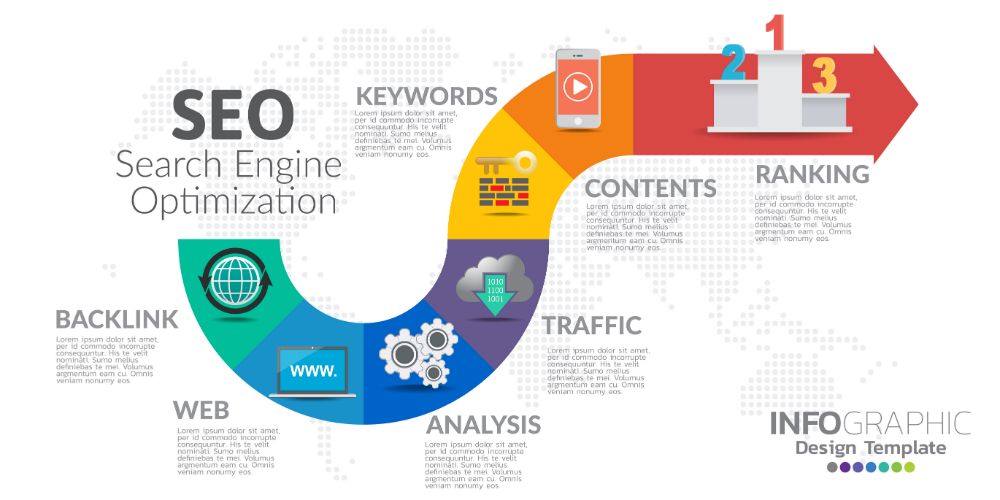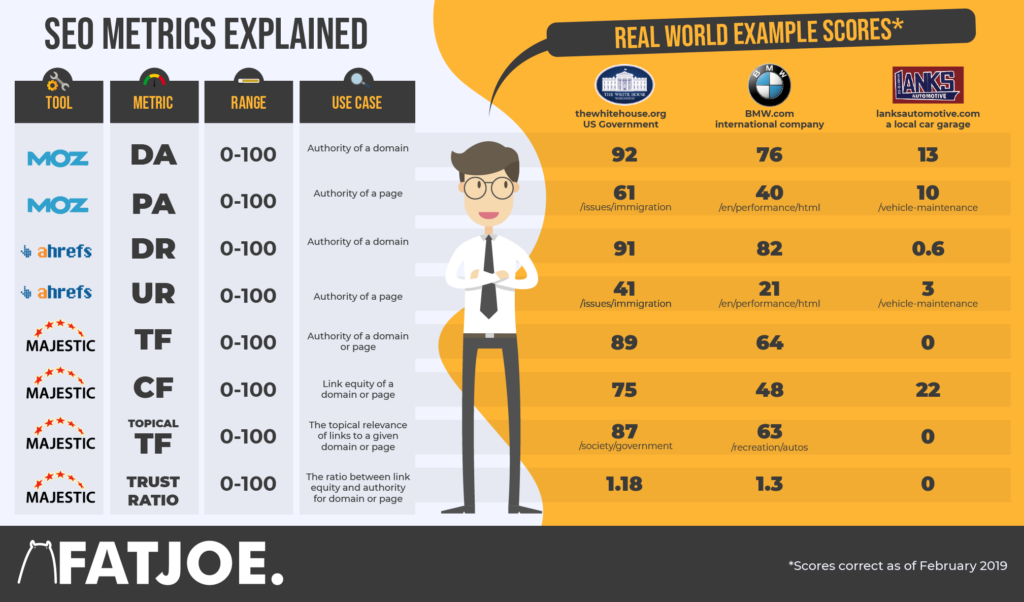Unveil the mysteries of your SEO score with key metrics that drive traffic, boost rankings, and increase online visibility.

Image courtesy of via DALL-E 3
Table of Contents
Introduction to SEO Scores
SEO, or Search Engine Optimization, is a critical aspect of making sure your website gets noticed on search engines like Google. When someone searches for something online, they usually only look at the first few results. That’s why having a good SEO score is essential – it helps your website appear higher in search results, making it more likely that people will click on it.
What is SEO?
SEO is all about making sure your website is set up in a way that search engines can easily understand what it’s about. By using specific keywords and following certain guidelines, you can increase the chances of your website showing up when someone searches for something related to your content.
Why SEO Scores Matter?
Knowing your SEO score is like having a report card for your website. It tells you how well your site is performing in terms of SEO, and where you can make improvements. By understanding your SEO score, you can take steps to boost your website’s visibility and attract more visitors.
Important Metrics for SEO Scores
When it comes to understanding your website’s performance on search engines like Google, there are specific metrics that play a crucial role in determining your SEO score. These metrics help search engines decide how visible your website should be in search results. Let’s take a closer look at some of the important factors that influence your SEO score:
Keyword Usage
Keywords are essential words or phrases that people use to search for information online. When you use relevant keywords on your website, it helps search engines understand what your content is about and match it with the right audience. By including the right keywords in your content, meta tags, and URLs, you can improve your chances of ranking higher in search results.
Page Speed
The speed at which your website loads is a critical factor for both user experience and SEO. Websites that load quickly tend to rank higher in search results, as search engines prioritize websites that offer a seamless browsing experience. To improve your page speed, consider optimizing images, minifying CSS and JavaScript files, and leveraging browser caching.
Mobile-Friendliness
With the majority of internet users accessing websites on their mobile devices, having a mobile-friendly website is essential for SEO success. Search engines like Google prioritize mobile-friendly websites in their search results, so it’s crucial to ensure that your website is responsive and easy to navigate on smartphones and tablets.
Keywords: The Building Blocks of SEO
Keywords are like clues that tell search engines what your content is about. When someone types a query into a search engine, it looks for these “clues” to match the most relevant content. So, it’s crucial to choose the right keywords that best represent your website or blog post.

Image courtesy of via Google Images
Using Keywords Effectively
Once you’ve picked the perfect keywords, it’s time to strategically place them on your website. These could be in your headings, title tags, meta descriptions, and throughout your content. But be careful not to overdo it! Search engines can spot when you’re trying too hard to manipulate them. Simply use your chosen keywords naturally and in context.
Understanding Your SEO Score
Understanding your SEO score can be made easier with the help of various SEO tools available online. Tools like Google Analytics can provide you with valuable insights into how well your website is performing in terms of SEO. These tools analyze different metrics and provide you with a comprehensive report on your website’s SEO health.
Reading Your SEO Report
Once you have used an SEO tool to analyze your website, it’s essential to know how to interpret the results. Your SEO report will highlight areas where your website is doing well and areas that need improvement. It will show you key metrics like keyword rankings, page speed, mobile-friendliness, and more. By understanding these metrics, you can make informed decisions on how to improve your website’s SEO score.
Improving Your SEO Score
One of the key factors in improving your SEO score is through on-page SEO. This means optimizing the content on your website to make it more search engine friendly. You can start by including relevant keywords in your content. These are the words or phrases that people are likely to type into search engines when looking for information. Make sure to use keywords naturally in your content, without overdoing it.

Image courtesy of via Google Images
Additionally, pay attention to your meta tags, such as title tags and meta descriptions. These tags provide information about your webpage to search engines and users, so make sure they accurately represent your content. Lastly, consider the overall design and structure of your website. A clean and user-friendly design not only improves the user experience but also signals to search engines that your site is high-quality and trustworthy.
Off-Page SEO
Off-page SEO refers to activities outside of your website that can impact your SEO score. One important aspect of off-page SEO is backlinking. Backlinks are links from other websites that point to your site. The more quality backlinks you have, the more credible your site appears to search engines. You can improve your backlink profile by reaching out to other websites for collaborations or guest posting opportunities.
Another off-page SEO strategy is to build a strong social media presence. Social signals, such as likes, shares, and comments on social media platforms, can also positively impact your SEO score. Make sure to share your content on social media channels and engage with your audience to build a loyal following.
Common Mistakes to Avoid
When it comes to SEO, there are some common mistakes that can negatively impact your website’s visibility on search engines. By avoiding these pitfalls, you can improve your SEO score and attract more visitors to your site. Let’s explore two key mistakes to watch out for:
Keyword Stuffing
One of the biggest mistakes people make in SEO is keyword stuffing. This practice involves cramming as many keywords as possible into your content in an attempt to rank higher in search results. However, search engines like Google have caught on to this tactic and now penalize websites that engage in keyword stuffing.
Instead of stuffing your content with keywords, focus on using them naturally and strategically. Incorporate keywords in your headings, subheadings, and throughout your content in a way that makes sense and provides value to your readers. Remember, quality content will always perform better than content that is filled with keywords.
Ignoring Mobile Users
In today’s mobile-centric world, ignoring the user experience on mobile devices can be a costly mistake. If your website is not optimized for mobile users, you could be missing out on a significant portion of your potential audience. Google and other search engines prioritize mobile-friendly websites in their rankings, so it’s essential to ensure that your site is responsive and easy to navigate on smartphones and tablets.
Make sure your website loads quickly on mobile devices, and that all buttons and links are easily clickable with a touchscreen. By optimizing your site for mobile users, you not only improve your SEO score but also provide a better experience for your visitors, ultimately leading to higher engagement and conversions.
Tracking Your SEO Progress
When you start working on your website’s SEO, it’s essential to have clear goals in mind. These goals could be increasing your website traffic, getting more leads, or improving your online visibility. By setting specific and achievable goals, you can track your progress more effectively and stay motivated.

Image courtesy of via Google Images
Monitoring Changes
One of the best ways to track your SEO progress is by monitoring changes in your SEO score over time. Keep an eye on key metrics like keyword rankings, organic traffic, and backlink profiles. By regularly checking these metrics, you can identify what’s working well and what needs improvement.
Staying Updated with SEO Trends
SEO is constantly evolving, with new trends and techniques emerging regularly. Keeping up with these changes is vital to ensure that your website remains visible in search engine results. Here are some tips on how to stay updated with the latest SEO trends:
Follow SEO Experts
One effective way to stay informed about SEO trends is to follow industry experts. These experts often share valuable insights, tips, and updates on their blogs, social media platforms, and at industry conferences. By following them, you can stay ahead of the curve and implement the latest SEO strategies on your website.
Join SEO Communities
Joining online SEO communities and forums is another great way to stay updated with SEO trends. These communities allow you to connect with other website owners, digital marketers, and SEO professionals. You can ask questions, share experiences, and learn from others in the industry. Additionally, these communities often provide valuable resources, such as webinars, workshops, and case studies, to help you stay informed about the latest SEO trends.
Conclusion
In conclusion, understanding and improving your SEO score is crucial for ensuring that your website can be easily found by potential visitors on search engines like Google. By optimizing various metrics and factors that influence your SEO score, you can enhance your website’s visibility and reach a wider audience.
Image courtesy of via Google Images
Recap
Throughout this article, we’ve covered the fundamentals of SEO scores, important metrics to consider, the role of keywords, strategies for improvement, common mistakes to avoid, tracking progress, staying updated with trends, and more. By paying attention to these key areas, you can enhance your website’s performance and reach online.
Final Thoughts
As you continue to learn and implement the techniques discussed in this article, remember that SEO is an ongoing process that requires patience and consistency. By applying the tips and strategies outlined here, you can make significant strides in improving your SEO score and ultimately attract more visitors to your website. Keep learning, experimenting, and refining your approach to SEO to achieve long-term success.
Want to turn these SEO insights into real results? Seorocket is an all-in-one AI SEO solution that uses the power of AI to analyze your competition and craft high-ranking content.
Seorocket offers a suite of powerful tools, including a Keyword Researcher to find the most profitable keywords, an AI Writer to generate unique and Google-friendly content, and an Automatic Publisher to schedule and publish your content directly to your website. Plus, you’ll get real-time performance tracking so you can see exactly what’s working and make adjustments as needed.
Stop just reading about SEO – take action with Seorocket and skyrocket your search rankings today. Sign up for a free trial and see the difference Seorocket can make for your website!
Frequently Asked Questions (FAQs)
What is an SEO Score?
An SEO score is a metric that evaluates how well a website is optimized for search engines like Google. It indicates how likely a site is to rank high in search results when people search for relevant keywords. A higher SEO score means better visibility and more potential for organic traffic to your website.
How often should I check my SEO score?
It’s a good idea to check your SEO score regularly to monitor your website’s performance and make necessary improvements. Depending on the size of your website and how frequently you update content, checking your SEO score once a month or quarterly can help you stay on top of your SEO game.
Can SEO scores change over time?
Yes, SEO scores can change over time due to various factors such as updates to search engine algorithms, changes in your website content or structure, or the competitive landscape. It’s essential to regularly assess and improve your SEO score to maintain or increase your website’s visibility in search results.







